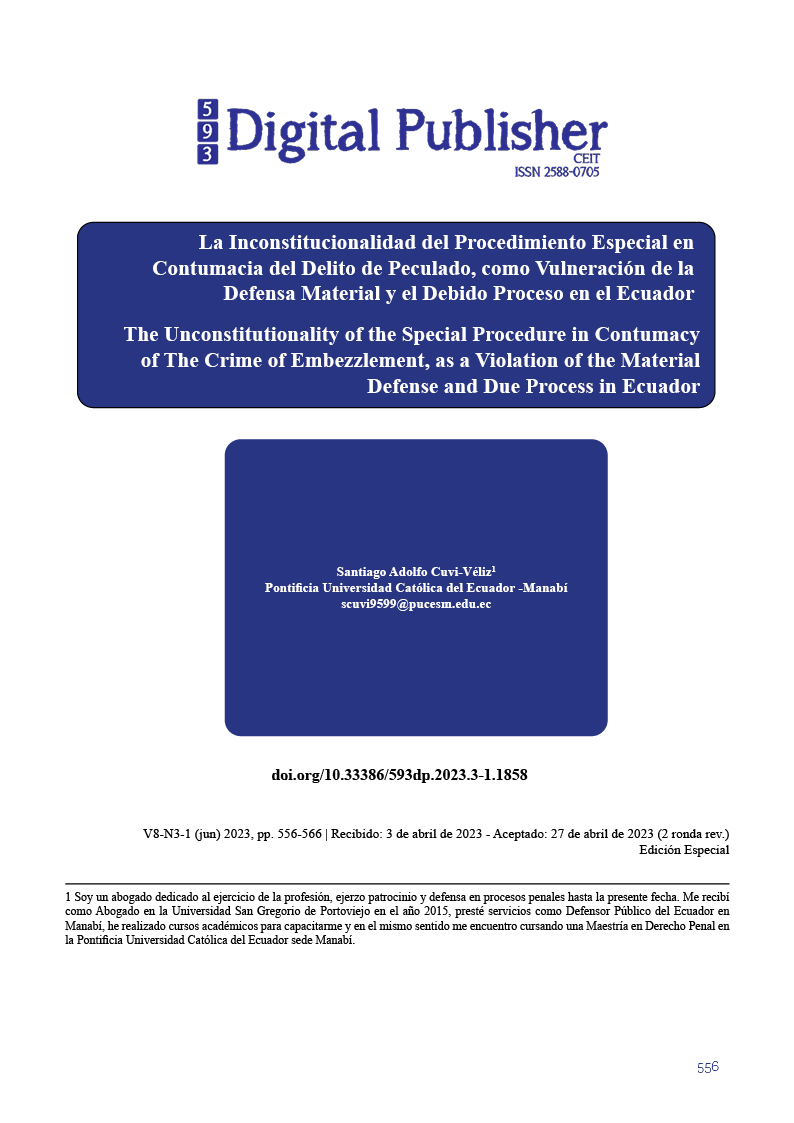The unconstitutionality of the special procedure in contumacy of the crime of embezzlement, as a violation of the material defense and due process in Ecuador
Main Article Content
Abstract
This investigation contemplates the unconstitutionality that entails the exercise and practice of a criminal process carried out in contempt to citizens accused of a crime. To be specific to the subject, this research develops the analysis regarding the typicity and unconstitutionality of the special criminal procedure contemplated by the Constitution of Ecuador and empowered by the Organic Integral Criminal Code for the crimes of Embezzlement, Concussion, Bribery and Illicit Enrichment, which substantiate and allow those accused of these types of crimes to be tried in contumacy. This absence of the accused in a trial hearing must be observed from its legal character and rights, that although it is true that the norm and the Ecuadorian law allows it for the crimes described above, this would not constitute something fair for the person to whom his legal situation would be resolved, starting from the premise that a right is not inalienable, the absence of the defendant would not imply a waiver of his right to material defense, much less his right to defence; That is, being tried in absentia constitutes a violation of rights, so this special criminal procedure would not guarantee a fair trial, nor respect for the right to defense.. Therefore, in this sense, it would be determined that this special criminal procedure, beyond not guaranteeing a fair trial, would constitute unconstitutional as it violates rights. However, we also find a contrast in other legislations, such as the Italian one, within which it is allowed to be tried in absentia those who consider that the non-presence of the accused does not violate rights as long as several conditions are met within the judicial process.
Downloads
Article Details

This work is licensed under a Creative Commons Attribution-NonCommercial-ShareAlike 4.0 International License.
1. Derechos de autor
Las obras que se publican en 593 Digital Publisher CEIT están sujetas a los siguientes términos:
1.1. 593 Digital Publisher CEIT, conserva los derechos patrimoniales (copyright) de las obras publicadas, favorece y permite la reutilización de las mismas bajo la licencia Licencia Creative Commons 4.0 de Reconocimiento-NoComercial-CompartirIgual 4.0, por lo cual se pueden copiar, usar, difundir, transmitir y exponer públicamente, siempre que:
1.1.a. Se cite la autoría y fuente original de su publicación (revista, editorial, URL).
1.1.b. No se usen para fines comerciales u onerosos.
1.1.c. Se mencione la existencia y especificaciones de esta licencia de uso.
References
Hernández, R., Fernández, C. y Baptista, P. (2003). Metodología de la investigación. Editorial Mc Graw-Hill.
Hernández-Sampieri, R., & Torres, C. P. (2018). Metodología de la investigación (Vol. 4, pp. 310-386). Ed. McGraw-Hill Interamericana.
Cabanellas, G. (2008). Diccionario Jurídico Elemental
Especifica
Pedon, E. (2011). Sobre La Contumacia. Revista de Derecho UNED.
Hammerschlag, D. (2020). Sobre La Constitucionalidad del Juicio en Ausencia. Revista Jurídica de la Universidad de Palermo
Obarrio, J. (2009) El Proceso Por Contumacia. Origen, Pervivencia y Recepción.
VACA, R. (2009) El Juicio En Ausencia. http://www.analisisjuridico.com/publicaciones/el-juicio-en-ausencia/#:~:text=Ausente%20ser%C3%ADa%20el%20procesado%20o,en%20general%2C%20se%20ha%20desentendido
Salgado, V. (2016). El juicio penal en ausencia del procesado y la imprescriptibilidad de la acción y de la pena, como medidas efectivas para reducir la impunidad en delitos en contra de la administración pública. http://repositorio.puce.edu.ec/handle/22000/12407
Gálvez, A. (2014). El Sistema Universal de los Derechos Humanos. España.
Montero, D. Derecho De Defensa En la Jurisprudencia de la Corte Interamericana de Derechos Humanos. https://www.corteidh.or.cr/tablas/r32676.pdf
Normativa
Asamblea Nacional. (2008). Constitución de la República del Ecuador. Quito - Ecuador: Ediciones Legales.
Asamblea Nacional. (2014). Código Orgánico Integral Penal (Vol. I). Quito, Pichincha, Ecuador: Ediciones Legales.
Tratados y Acuerdos Internacionales
Convención Americana Sobre Derechos Humanos (1969), entrada en vigor: 18 de julio de 1978.
https://www.cva.itesm.mx/biblioteca/pagina_con_formato_version_oct/apa.htm
https://www.iusinitinere.it/il-processo-penale-in-absentia-dellimputato-16886
https://www.clarin.com/politica/abren-juicio-astiz-tigre-acosta-roma_0_ryp8-pxCte.amp.html


